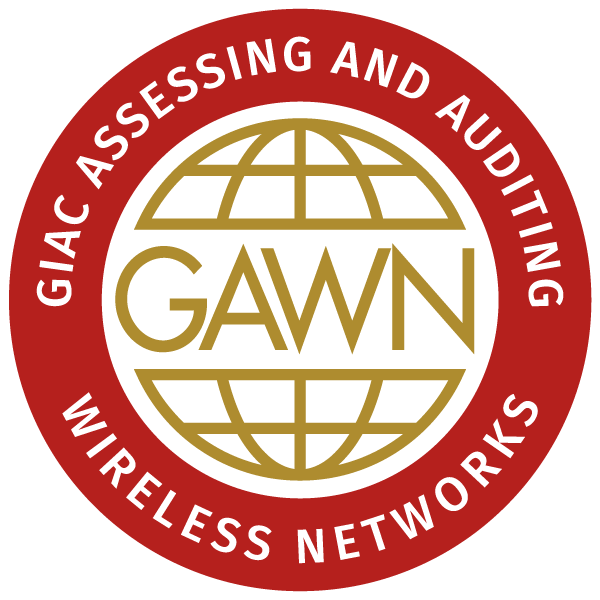Areas Covered
- Attacking weak encryption, 802.11 fuzzing attacks, and bluetooth attacks
- Bridging the air gap, DoS on wireless networks, high-frequency RFID attacks, and RFID applications
- Hotspots, low-frequency RFID attacks, NFC, practical SDR attacks, and rogue networks
- Sniffing wireless, wireless basics, wireless client attacks, WPA, and Zigbee
Who is GAWN for?
- Auditors
- Ethical hackers and penetration testers
- Network security staff
- Network and system administrators
- Incident response teams
- Information security policy decision-makers
- Technical auditors
- Information security consultants
- Wireless system engineers
- Embedded wireless system developers
Exam Format
- 1 proctored exam
- 75 questions
- 2 hours
- Minimum passing score of 70%
Note: GIAC reserves the right to change the specifications for each certification without notice. Based on a scientific passing point study, the passing point for the GAWN exam has been determined to be 70% for all candidates receiving access to their certification attempts on or after August 14th, 2013. To verify the format and passing point of your specific certification attempt, read the Certification Information found in your account at https://exams.giac.org/pages/attempts.
Delivery
NOTE: All GIAC Certification exams are web-based and required to be proctored. There are two proctoring options: remote proctoring through ProctorU, and onsite proctoring through PearsonVUE. Click here for more information.
GIAC certification attempts will be activated in your GIAC account after your application has been approved and according to the terms of your purchase. Details on delivery will be provided along with your registration confirmation upon payment. You will receive an email notification when your certification attempt has been activated in your account. You will have 120 days from the date of activation to complete your certification attempt.
Exam Certification Objectives & Outcome Statements
- 802.11 Fuzzing Attacks The candidate will be able to perform basic fuzzing attacks.
- Attacking Weak Encryption The candidate will be familiar with weak encryption methods including WEP and how to attack and secure them.
- Bluetooth Attacks The candidate will be familiar with the structure, uses and weaknesses of Bluetooth.
- Bluetooth Low Energy Attacks The candidate will demonstrate understanding of how changes to Bluetooth Low Energy affect security, and methods to test, inspect, and audit Bluetooth Low Energy data in transit.
- Bridging the Air Gap The candidate will be able to use a compromised wireless system to further compromise a wired network.
- DoS on Wireless Networks The candidate will be able to perform and defend against common DoS attacks.
- High-Frequency RFID Attacks The candidate will demonstrate understanding of RFID tracking techniques, and how to exploit mid to long-range RFID applications.
- Hotspots The candidate will be familiar with the identification and auditing of hotspots.
- Low-Frequency RFID Attacks The candidate will demonstrate understanding of short-range, Low Frequency (LF) RFID attacks, including impersonation and cloning of Low-Frequency RFID tags.
- NFC The candidate will demonstrate understanding of Near Field Communications (NFC) and how it uses consistent data protocols to exchange data bidirectionally for uses in payment systems, and generic data transfers.
- Practical SDR Attacks The candidate will be familiar with the common implementations of wireless protocols and how SDR projects can identify failures in the overall implementation of those protocols.
- Rogue Networks The candidate will understand how to identify and protect against rogue networks.
- Sniffing Wireless The candidate will be capable of capturing wireless traffic.
- Wireless Basics The candidate will be familiar with common wireless threats as well as current wireless network standards.
- Wireless Client Attacks The candidate will demonstrate understanding of wireless client vulnerabilities, including hotspot injection, weaknesses in wireless client segmentation or public secure packet forwarding, and the preferred network list on client systems.
- WPA Variants The candidate will be familiar with WPA Variants including how to attack and secure it.
- Zigbee The candidate will be familiar with Zigbee including how to attack and secure it.
Other Resources
- Training is available in a variety of modalities including live training and OnDemand
- Practical work experience can help ensure that you have mastered the skills necessary for certification
- College level courses or self paced study through another program or materials may meet the needs for mastery.
- Get information about the procedure to contest exam results.
Practice Tests
- These tests are a simulation of the real exam allowing you to become familiar with the test engine and style of questions.
- Practice exams are a gauge to determine if your preparation methods are sufficient.
- The practice bank questions are limited so you may encounter the same question on practice tests when multiple practice tests are purchased.
- Practice exams never include actual exam questions.
- Purchase a GAWN practice test here.
- GIAC recommends leveraging additional study methods for test preparation.


